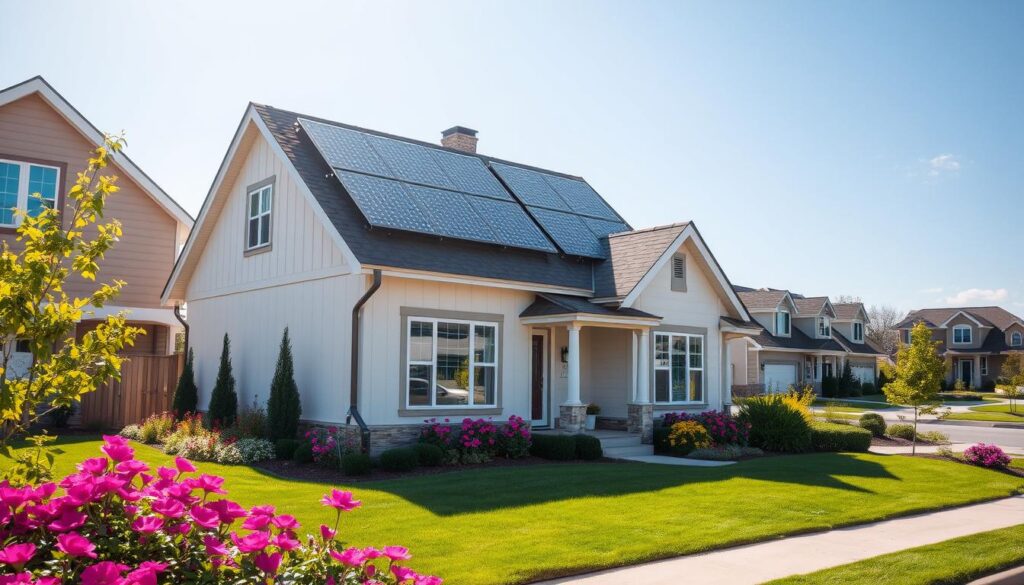Did you know that an average American household can save up to $1,000 annually by installing solar panels? This impactful statistic only scratches the surface of the advantages of solar power. The benefits of switching to renewable energy range far beyond financial savings. By investing in solar panels, you are also committing to sustainable living, which can significantly reduce your carbon footprint and contribute to a cleaner, greener planet. Solar energy is not just a personal advantage; it plays an integral role in the national strategy for a more self-sufficient and environmentally friendly energy source.
Key Takeaways
- Solar panel installation can save an average American household up to $1,000 annually on electricity bills.
- One of the primary advantages of solar power is its potential to significantly reduce greenhouse gas emissions.
- Investing in solar panels is a step towards sustainable living and renewable energy adoption.
- Solar power contributes to a cleaner and more self-sufficient energy future.
- Government incentives and rebates can significantly offset the initial cost of solar panel installation.
Energy Savings on Utility Bills
Harnessing solar energy can deliver remarkable benefits by significantly reducing electricity bills. The integration of solar panels into your home not only offers energy savings but also ensures long-term cost-effectiveness.
How Solar Panels Reduce Electricity Costs
Solar panels work by converting sunlight into electricity, offsetting the amount of energy you need to purchase from the grid. This direct reduction in purchased electricity leads to substantial energy savings, contributing to a noticeable reduction in electricity bills. As utility rates continue to climb, these savings become even more pronounced, promoting a sustainable financial choice for homeowners.
Long-Term Financial Benefits
Investing in solar panels presents a lucrative financial decision over the long term. While the initial installation costs might seem significant, the consistent reduction in electricity bills results in a notable return on investment. Many solar systems pay for themselves within several years, and the continued energy savings further underscore the cost-effectiveness of solar energy solutions.
Calculation of Savings Over Time
Determining the savings from solar panels involves several factors, including system size, energy consumption patterns, and local utility rates. Utilizing tools and resources from reputable organizations like the National Renewable Energy Laboratory (NREL) can help estimate these savings, offering homeowners a clear picture of potential cost reductions over time. Accurate calculations allow for informed decisions, ensuring maximum energy savings and financial benefits.
| Year | Energy Savings | Reduction in Electricity Bills | Cost-Effectiveness |
|---|---|---|---|
| Year 1 | $500 | 15% | Immediate savings begin |
| Year 5 | $2,500 | 25% | ROI reached |
| Year 10 | $5,000 | 30% | Significant profit from savings |
Environmental Impact
The environmental impact of installing solar panels is profound and offers numerous benefits for our planet. Chiefly, these benefits arise from the significant decrease in carbon footprint. Solar energy systems are a viable alternative to fossil fuels, as they do not emit greenhouse gases. This makes them an essential part of efforts to combat climate change and contribute to a healthier environment.
Decreasing Carbon Footprint
Solar panels play a critical role in decreasing the carbon footprint. By generating electricity from the sun, homeowners can minimize their reliance on fossil fuels, effectively reducing the emission of harmful pollutants. This transition towards cleaner energy can significantly lower the amount of carbon dioxide—one of the primary greenhouse gases—released into the atmosphere.
Contribution to Renewable Energy
Furthermore, the contribution to renewable energy by adopting solar solutions is substantial. Homeowners who install solar panels are part of a larger movement towards sustainable energy practices. According to reports from the International Energy Agency (IEA), solar power’s role in promoting cleaner air and water is growing at an unprecedented rate. Expanding the use of renewable energy sources such as solar is crucial for reducing our environmental impact and fostering a sustainable future.
Increase in Home Value
Installing solar panels brings numerous benefits, one of the most significant being a property value increase. These eco-friendly home features are increasingly viewed as valuable home improvements. By effectively combining sustainability with technology, solar panels cater to modern homebuyers’ preferences.

Solar Panels as Home Improvements
Solar panels are an excellent example of home improvements that not only enhance aesthetic appeal but also offer functional benefits. They contribute to reducing utility bills, which is attractive to potential buyers. As a result, homes with solar panels often experience a notable property value increase. This improvement aligns well with the growing market trend towards energy-efficient and eco-friendly homes.
Market Demand for Eco-Friendly Features
The market demand for eco-friendly home features is on the rise. According to real estate studies like those from Zillow, homes equipped with solar energy systems can command higher prices compared to those without. This premium is not merely due to potential energy savings, but also because of the modern appeal associated with such sustainable living amenities. Therefore, investments in solar panels can lead to a significant property value increase, making them a worthwhile addition to any home.
Government Incentives and Rebates
The adoption of solar energy is strongly encouraged through numerous government initiatives. By offering a range of tax incentives and rebates, the federal and state governments play a crucial role in making solar panel installations more affordable for homeowners and businesses.
Federal Tax Credits for Solar
The Federal Solar Investment Tax Credit (ITC) is one of the most significant financial benefits available to those installing solar panels. This federal tax credit allows taxpayers to claim a percentage of the total installation cost, effectively reducing the overall expenditure. The ITC has been instrumental in driving the adoption of solar energy across the country, highlighting the government’s commitment to renewable energy sources.
State-Specific Incentives and Programs
Various states offer their own unique incentives and rebates, further decreasing the cost of solar installations. These state-specific solar programs may include additional tax credits, rebates, or performance-based incentives. Resources like the Database of State Incentives for Renewables & Efficiency (DSIRE) provide comprehensive information on available programs, ensuring consumers can maximize their savings.
| Incentive Type | Description | Benefit |
|---|---|---|
| Federal Tax Credit (ITC) | Credits a percentage of the cost of installing a solar system on federal taxes. | Significant reduction in installation cost |
| State-Specific Solar Programs | Varies by state; can include additional tax credits, rebates, and performance-based incentives. | Further lowers the overall cost of solar panel installation |
Low Maintenance Requirements
The appeal of solar panels is significantly enhanced by their low maintenance requirements. Homeowners can enjoy many years of reliable electricity generation without frequent servicing. Here, we explore the enduring benefits.
Durability and Longevity of Solar Panels
A key selling point is the unparalleled durability of solar panels. Many models come with warranties ranging from 20 to 25 years, assuring sustained performance over decades. Leading industry sources like the Solar Energy Industries Association (SEIA) highlight that these panels require minimal intervention to keep operating at peak efficiency. This durability translates into remarkable long-term savings on both energy expenses and maintenance costs.
Minimal Upkeep Needed
Maintaining solar panels is remarkably straightforward compared to other energy systems. Routine tasks such as simple cleaning and periodic inspections are generally all that’s needed to ensure consistent energy output. This ease of upkeep contributes to the overall appeal and reinforces the benefit of low maintenance. These minimal requirements not only reduce the time and effort involved but also lead to considerable long-term savings by eliminating frequent repair and maintenance costs.
| Aspect | Details |
|---|---|
| Durability | 20-25 years warranty |
| Maintenance | Simple cleaning and inspections |
| Long-Term Savings | Reduced energy and upkeep costs |
Energy Independence
Achieving energy independence is a significant advantage of installing solar panels. By harnessing the power of the sun, homeowners can generate their own electricity and reduce their reliance on traditional energy sources.

Reducing Dependence on Fossil Fuels
One of the primary benefits of solar panels is reducing fossil fuel dependence. By switching to solar energy, individuals can decrease their consumption of non-renewable resources like coal, oil, and natural gas. This not only helps the environment but also supports national efforts to reduce dependency on foreign energy imports.
Benefits of Utilizing Local Energy
Local energy utilization through solar panels provides a host of benefits. Generating electricity locally reduces transmission losses and enhances grid stability. Additionally, relying on local solar resources shields homeowners from fluctuating energy prices in global markets. This self-sufficiency strengthens national security and promotes sustainable energy practices.
Grid Security and Resilience
Solar panels significantly contribute to grid security and resilience by diversifying energy sources. This distributed generation capability enhances local energy reliability, which is crucial during peak demand times or outages. Such reliability helps minimize the impacts of natural disasters or other grid interruptions, a concern highlighted by the Federal Energy Regulatory Commission (FERC).
Enhancing Local Energy Reliability
By integrating solar panels into the energy mix, communities achieve a higher degree of energy reliability. This localized generation ensures a consistent power supply, even when centralized grid systems face strain or failure. Solar energy allows for a decentralized approach, contributing to the strength and flexibility of the overall grid infrastructure.
Reducing Vulnerability During Outages
The resilience of the energy grid is significantly bolstered by the adoption of solar technology. During outages or peak demand periods, such distributed energy resources ensure continuous power flow. This not only reduces vulnerability but also supports quicker recovery times in the aftermath of disruptions, thereby maintaining essential services and minimizing downtime.
| Aspect | Benefit |
|---|---|
| Grid Security | Increased protection against outages and disruptions |
| Resilience | Enhanced ability to withstand and recover from grid failures |
| Energy Reliability | Consistent power supply during peak demand and emergencies |
Advancements in Solar Technology
The solar industry is experiencing remarkable transformations with ongoing solar technology advancements. Innovations in photovoltaic materials and efficient manufacturing processes are crucial to these progressions, ultimately boosting panel efficiency and expanding the potential applications of solar energy. Let’s explore the evolution of solar panel efficiency and emerging innovations in solar energy.
The Evolution of Solar Panel Efficiency
Over recent years, breakthroughs in solar panel efficiency have been significant. Enhanced photovoltaic cells and the incorporation of cutting-edge materials like perovskite are pushing the boundaries. These advancements are enabling panels to capture more solar energy even in lower light conditions. The American Solar Energy Society (ASES) continues to report numerous milestones that underscore these improvements.
Emerging Innovations in Solar Energy
Emerging innovations in solar energy are setting new industry standards. Technologies such as bifacial solar panels and solar skins are transforming how we think about solar installations. Bifacial panels can harness light from both sides, thus maximizing energy production. Meanwhile, solar skins make it possible to blend solar panels with a building’s aesthetics without compromising functionality. These developments show a promising future for solar energy, emphasizing the critical role of ongoing solar technology advancements.
| Innovation | Benefit |
|---|---|
| Bifacial Solar Panels | Increased energy production by capturing light from both sides |
| Solar Skins | Enhanced aesthetic integration with minimal efficiency loss |
| Perovskite Cells | Higher efficiency at a lower cost |
Community and Economic Growth
The solar energy sector is a significant catalyst for community and economic growth. It not only aids in reducing carbon footprints but also plays a pivotal role in fostering vibrant local economies. By investing in solar energy, communities can take advantage of numerous economic benefits, including job creation and the support of local businesses.
Job Creation in the Renewable Sector
One of the most significant contributions of the solar industry to economic growth is job creation. According to the Solar Jobs Census, the renewable energy sector, particularly solar, has generated thousands of new jobs across the United States. These positions range from manufacturing solar panels to their installation and maintenance, providing stable employment opportunities and economic growth within local communities.
Supporting Local Solar Companies
Emphasizing the support for local businesses, consumers who choose local solar companies contribute directly to the economic vitality of their communities. Opting for a local solar installation not only promotes sustainable practices but also stimulates regional economic vibrancy. By supporting regional solar firms, consumers help ensure the continued growth of a robust and dynamic local economy while fostering a strong sense of community. This deliberate choice further underscores the broader environmental and economic growth benefits of solar energy.


